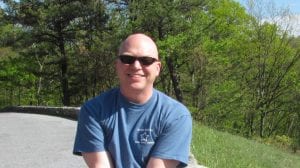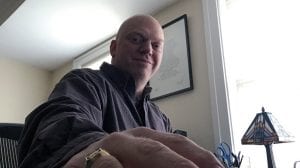Joh n Deuel needed a break. After four years at Rice University, his academic progress was unsatisfactory so he applied for a full-time job working on the new campus network.
n Deuel needed a break. After four years at Rice University, his academic progress was unsatisfactory so he applied for a full-time job working on the new campus network.
Deuel said, “Growing up, I was always taking things apart and putting them back together. As soon as computers were a thing, I was saving up to buy one. The intro comp sci class was the first time I got my hands on UNIX. I kind of lost myself in it –you couldn’t get me out of the lab or off the machine.”
Around Deuel’s senior year, a self-study had revealed the need for an engineering school-wide shared computing resource for undergraduate students. The project was commissioned and called OwlNet, but no one at ICSA (Rice’s Institute of Computing Services and Applications) could be spared to build and run the new network. ICSA Director Priscilla Huston and OwlNet Director Sam Davis hired Deuel for the role.
“That was in 1987. They handed me a stack of purchase orders and said, ‘Watch the loading dock, stuff is coming.’ Workstations started arriving, the university picked places for the labs, and we ran cables and set up machines. Farrell Gerbode, Vicky Dean, Richard Schafer, and the faculty in Computer Science and Math Sciences taught me a lot, and Michael Pearlman was an incredible mentor.”
More full-time staff were added to the OwlNet project, and the university expanded the network to additional students and labs. Deuel ended up managing a team of undergraduate student workers including William Deigaard, who would later become Rice’s networking director.
While managing employees and projects, Deuel carved out time to finish his CS degree (BA CS ’90), but he credits his OwlNet role for his early career success. He said, “That job and those people led to my next job. It launched my career in just about every way you can imagine.”
Three years after leaving Rice, Deuel had reached the C-suite. He worked as a CTO for four years while the dot com boom was reaching its peak, and continued managing teams of engineers through the bubble’s burst. Deuel said keeping his employees motivated through a series of layoffs required him to be transparent about the changes.
“Layoffs and other difficult situations are part of real life. When they happen, it’s important to be transparent about what’s occurring and why. You aren’t responsible for others’ mistakes, but sometimes those mistakes affect your life. Don’t sugarcoat it. Make it real. Look for learning opportunities. What are the growth opportunities? What are the silver linings?”
Deuel had built a strong engineering team before the layoffs began. He managed his engineers through first one layoff and then another. When the third layoff rolled around, Deuel put his own position on the chopping block.
He said, “I no longer enjoyed managing through the continual cuts. Outside forces influenced strategic decisions, and led to directions like, ‘Take your seven person team and do the work with four or five.’ Obviously, we would not be able to do the same amount of work or work as quickly. It felt like people were making decisions that did not have enough long-term vision in them.”
Deciding to lay himself off led to what he jokingly calls his mid-career retirement. He was out of work for 20 months. Deuel was surprised at the depth of emotional impact his extended unemployment wrought.
He said, “How do you survive that? I had gone into it thinking, ‘I’m good at what I do; the company is struggling, and I am not doing what I want to do, so I’ll find something else.’ I had prepared financially and had a good severance package, so I wasn’t even looking in the beginning.
“But being unemployed still hit me hard. Not working every day took a very subtle toll on my sense of well-being. I had to constantly re-focus my thoughts, reminding myself that there were still good things to do in the world. Then people came looking for me again.”
For the last eleven years, Deuel has been working in the database security industry. While he was initially recruited for the breadth of his expertise in both networking and systems, his experience building and leading software development teams proved just as valuable. Deuel now manages the teams responsible for the database security products. He still contributes his own technical skills, as the challenge of efficiently analyzing and reporting database security vulnerabilities isn’t surmountable without deep system and network architecture expertise.
Although Deuel enjoys this work, he’s realized over the last few years that his favorite days are those when his team members feel successful.
“A good day for me is when the people on my team have a good day. Happy customers and a profitable business are the means to an end, and the end is team members who enjoy coming to work. When they hit a milestone, make a breakthrough in their tech challenges, feel good about their contribution, those are my best days.”
Deuel’s path to career success may have hit some unexpected detours, but his convoluted journey taught him to be open to new opportunities. He also chose several detours rather than remain in situations that did not feel right. His advice to current CS students is two-fold:
“Stay flexible, and periodically spend time reflecting on what really matters to you. Flexibility is important because technology changes really fast. If you can, avoid becoming too attached to one method, one paradigm. Things go south and come back; being flexible makes it easier to ride the waves.
“But because things are moving fast, time gets away from you. Before you know it, years have gone by. That’s why you should intentionally take breaks to figure out what’s important to you. If you take that time to think about what makes you happy, you won’t wake up wondering where the time went.”
John Deuel completed his B.A. in Computer Science at Rice University in 1990.
